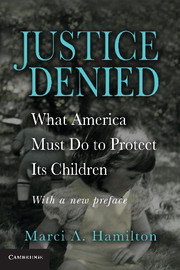Book contents
- Frontmatter
- Contents
- Acknowledgments
- 1 We Have Failed Our Children
- 2 What Is Wrong with the System? The Courthouse Doors Are Closed to Survivors
- 3 The Solution Is Clear and Simple: Abolish the Statutes of Limitation for Childhood Sexual Abuse
- 4 What It Will Take to Protect Children: What the States Must Do; What the Federal Government Should Do
- 5 Barrier #1: The Insurance Industry
- 6 Barrier #2: The Hierarchy of the Roman Catholic Church
- 7 The Other Barriers: Teachers, Defense Attorneys, and an Uninformed Public
- Conclusion: The Coming Civil Rights Movement for Children
- Appendix to Chapter 4
- Appendixes to Chapter 6
- Notes
- Index
7 - The Other Barriers: Teachers, Defense Attorneys, and an Uninformed Public
Published online by Cambridge University Press: 03 May 2010
- Frontmatter
- Contents
- Acknowledgments
- 1 We Have Failed Our Children
- 2 What Is Wrong with the System? The Courthouse Doors Are Closed to Survivors
- 3 The Solution Is Clear and Simple: Abolish the Statutes of Limitation for Childhood Sexual Abuse
- 4 What It Will Take to Protect Children: What the States Must Do; What the Federal Government Should Do
- 5 Barrier #1: The Insurance Industry
- 6 Barrier #2: The Hierarchy of the Roman Catholic Church
- 7 The Other Barriers: Teachers, Defense Attorneys, and an Uninformed Public
- Conclusion: The Coming Civil Rights Movement for Children
- Appendix to Chapter 4
- Appendixes to Chapter 6
- Notes
- Index
Summary
The only thing necessary for the triumph of evil is for good men to do nothing.
Edmund BurkeA staggering fact is that children are most at risk of sex abuse when we think they are safest: at home, at school, and at church. Worse, many of the folks we would assume are lobbying our state legislators to protect children, like parents, teachers, lawyers, and civil rights groups, are actually working against victims of child sex abuse in the legislative context. In this chapter, I will unmask the enemies to legislative reform beyond the insurance industry and the Roman Catholic Church: teachers (and their unions), defense attorneys (including civil liberties groups), and a woefully uninformed public.
DEEPLY ROOTED SOCIAL PRACTICES HAVE CREATED THE CONDITIONS THAT VICTIMIZE SO MANY CHILDREN
The statistics in Chapter 1 are worth repeating: studies say about at least 25 percent of girls and 20 percent of boys are sexually abused, and 90 percent of abuse is never reported to authorities. It takes the commitment of an entire culture to repress, hide, and permit the suffering of so many people.
As has been documented again and again, the Roman Catholic Church has engaged in an orchestrated cover-up of child abuse; the same can be said for a number of other religious organizations, such as the Church of Jesus Christ of Latter-day Saints (the Mormons), the Jehovah's Witnesses, the Southern Baptists, and many others. Why so many religious organizations?
- Type
- Chapter
- Information
- Justice DeniedWhat America Must Do to Protect its Children, pp. 97 - 110Publisher: Cambridge University PressPrint publication year: 2008

